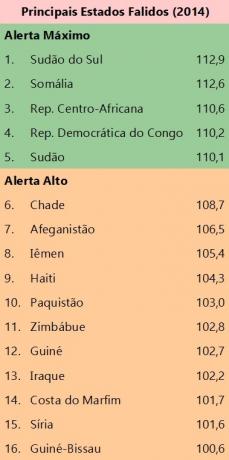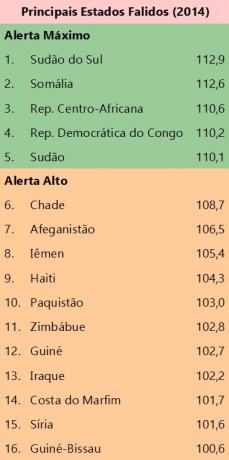The term "failed states" — sometimes also called fragile states — is used to designate those countries that have a great weakness in its maintenance, mainly in political terms. They are, therefore, those National States that have the most difficulties in exercising their sovereignty in their respective territories.
Despite being a widely used term, the expression "Failed States" is not considered didactic to explain its meaning, as when we talk about something "bankrupt", we usually refer to an institution that is economically and financially lost or in a phase of scarcity extreme.
In the case of fragile states (a term more recently used to replace this expression), "bankruptcy" is not necessarily economic, but rather structural, social and political, with many sometimes related to the difficulty of protecting borders, weakness in the face of foreign invasions or the outbreak of civil wars, among countless other factors.
In a more simplistic and objective definition, the Failed State concept
it refers to the degree of vulnerability in the face of conflicts, external or internal wars and the socioeconomic disintegration of its inhabitants. In this sense, the most common cases of Failed States are found in newly independent or owned countries. to completely politically fragile regions such as sub-Saharan Africa, the Middle East, Latin America and others.In many cases, the constitution of Failed or Fragile States is linked to the imminent growth of terrorist groups in a given country. After all, territories with greater political, economic and social fragility that have a large number of unemployed young people and a delicate structural scenario are more likely to emerge of social uprisings or the manipulation of its population by armed groups with hidden purposes, such as the implantation of fundamentalist and dictatorial governments through revolts armed.
There's one world ranking of failed states which is released annually by the Fund for Peace and International Policy (FFP). For the elaboration of this ranking, a series of twelve different factors is considered, scored from 1 to 10 each, and covering themes such as social conflicts, risks of terrorism, corruption rates and others. Thus, the maximum score is 120 points, and the countries that are closest to that number are those in complete bankruptcy.
The FFP classifies the ranking countries into eleven different categories, namely:
high alert (very high alert): greater than 110 points – five countries
High alert: between 100 and 110 points – eleven countries
Alert: between 90 and 100 points – eighteen countries
very high risk: between 80 and 90 points – thirty-two countries
High risk: between 70 and 80 points – forty-three countries
At risk: between 60 and 70 points – twenty-seven countries
Unstable: between 50 and 60 points – twelve countries
Stable: between 40 and 50 points – fifteen countries
very stable: between 30 and 40 points – twelve countries
Sustainable: between 20 and 30 points – twelve countries
very sustainable: less than 20 points - one country
From this perspective, of the five countries that make up the group of high alert, all are in Sub-Saharan Africa, which triggers the high degree of instability that marks this area. Already in the group of high alert, five are from the same region, in addition to another five from Asia (four of them from the Middle East) and one from Latin America, Haiti. Check out the table below:

World Ranking of Top Failed States *
We can see that political stability is one of the factors that weighs most, as all these countries have gone through recent conflicts or are currently experiencing them. South Sudan, in first place, is also the youngest country in the world, newly separated from sudan, fifth place, so that both still go through many disputes for the establishment of their sovereignty and dominion over border areas. Somalia is undergoing serious social upheavals and is considered one of the poorest and most corrupt countries in the world.
In this ranking, the Brazil is in the 125th position, with 61.4 points, being inserted in the category at risk. The main factors that prevent the country from scoring lower are the high social inequality that still persists and the great social and economic dependence. However, the country showed improvements compared to the previous year, when it had been in 52nd position. The "least bankrupt" country in the world, so to speak, and the only one ranked in the category very sustainable it's Finland, who scored just 18.7 points.
________________________
* Data source: The Fund for Peace, 2014.
By Me. Rodolfo Alves Pena
Source: Brazil School - https://brasilescola.uol.com.br/geografia/estados-falidos.htm

